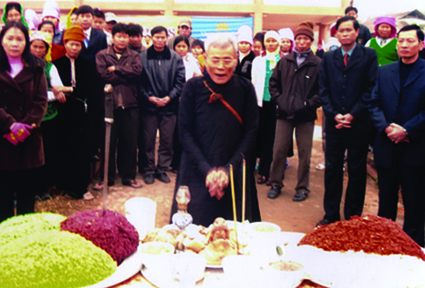>>Hair washing ceremony of the Thai
>>New rice ceremony of the Thai
>>Rules and conventions of the Thai ethnic minority
Ta Thi Tam
Ethnology Institute
Matrilocal residence is compulsory for every Thai man before he starts raising his own family.
This is an age-old tradition of the Thai which gives a son-in-law a chance to show his respect and gratitude to his parents-in-law for giving birth to and bringing up a good wife for him.
In the old time, matrilocal stay was a condition for a Thai man to become a true family head and a full-fledged community member. Only a married man who had stayed with his wife’s family could receive from his community fields for farming.
The matrilocal duration is decided by the bride’s family, depending on the social rank and financial conditions of the groom’s family. The higher rank the groom’s family has, the longer his matrilocal stay lasts. A man from an aristocratic family may have to stay with his wife’s family for as long as 12 years while the one from a poor family is supposed to live with his parents-in-law for just three years. A groom can shorten his stay by giving offerings to pay his parents-in-law off for raising his wife.
In the middle of his stay, a groom may stop his matrilocality for a special reason but has to give gifts as compensation for the remaining period of his matrilocality.
A matrilocal residence starts with a test period of between six months and one year, called khuoi quan by Thai people. After this period, the wedding is held and followed by the official stay of the groom.

In order to hold the wedding after the khuoi quan of the groom, his family has to give betrothal gifts to the bridal family, which are calculated based on the age of the bride, with each year equivalent to five loads of rice.
After the wedding, the groom starts his matrilocal life, taking charge of all affairs from farming, hunting, and fishing to taking care of his parents-in-law. Every day, the groom has to work from dawn till dusk, trying best to make wealth for his wife’s family. A lazy groom may be sent back home by his parents-in-law.
During his stay, the groom must sleep alone in the right part of the house while his wife stays at the opposite side and the couple is not supposed to bed. If this happens, the groom must pay a fine of at least five silver coins. During this time, the couple can secretly meet their former lovers but if the bride is caught by her husband while doing so, the groom can take his wife home without having to pay compensation to her parents, ending his matrilocal residence.
While staying at his wife’s home, the groom is not supposed to pass the family altar and must squat when having meal. If the bride’s mother is not pleased with her son-in-law, she can send him home. In this case, the groom’s brother can replace him. In case the groom is not pleased with his bride, he can leave her family at his own will while the girl can do nothing except following her mother’s decision.
To please his wife’s family, it is important for the groom to please the bride’s uncle who will advise him how to become a good son-in-law.
A month after his stay at his wife’s home, the groom can go with his wife to visit his parents. The girl’s family prepares presents for her to give to her parents-in-law, including cloth, scarves and pillows. The groom’s parents also prepares presents for their daughter-in-law, including jewelries and brocade clothes, and for her parents as well.
The groom’s matrilocal residence only ends with a formality called phai xua, which means deliver a shirt, implying that the spirit of the girl now belongs to her husband’s family once her shirt is given to them. After this formality, the couple can live with the groom’s parents or reside separately.-

